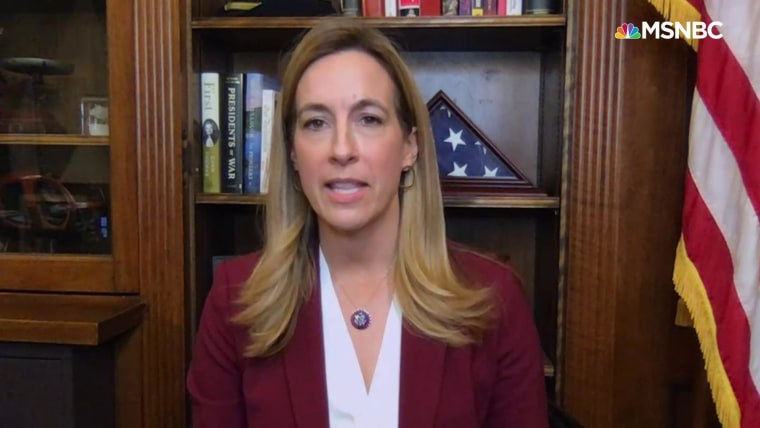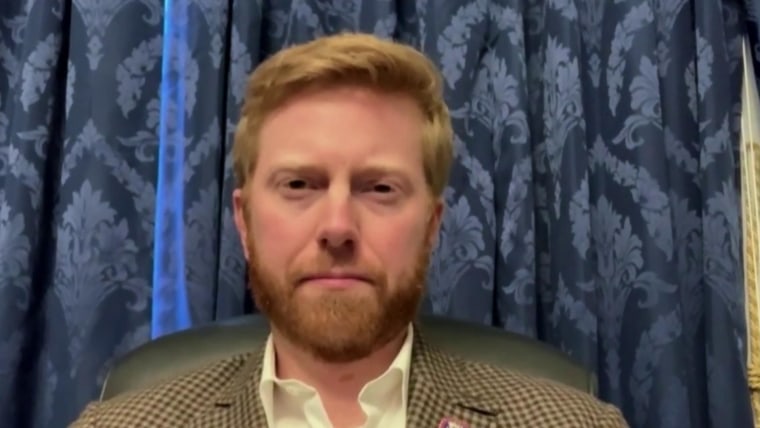WASHINGTON — After last week's deadly assault on the U.S. Capitol by supporters of President Donald Trump, members of Congress are expressing something once unthinkable: that some of their own colleagues may be endangering their lives. Not in a rhetorical sense, but in a direct and immediate way.
"It's the most poisonous I've ever seen," Rep. Don Beyer, D-Va., said in an interview. "There's the overall sense that maybe if some of them have guns — and likely the ones who are more into conspiracy theories and QAnon with the pedophilic satanic rings — are we safe from them?"
Since the deadly riot Jan. 6, lawmakers have suggested — not, so far, backed up by evidence — that far-right colleagues may have helped plan or guide the attack. There are particular concerns about some newly elected members who have espoused extremist views, including comments supportive of the QAnon lie that accuses perceived enemies of Trump of being part of a child-abusing cult.
One House freshman is pushing to carry firearms on Capitol grounds, and another recounts being armed during the attack, further putting their colleagues on edge. With the support of Speaker Nancy Pelosi, D-Calif., security officials have installed metal detectors outside the House floor, causing tension among some Republicans and effectively suggesting that members themselves may pose a danger.
Democrats are outraged at 147 Republicans who they say abided by the rioters' calls and voted to overturn the election results even after the violent attack, which left five people dead and forced lawmakers to hide in their offices and safe rooms.
But, Beyer said, the issue "that has the greater emotional impact is the sense that there's perhaps actual physical danger from our colleagues."
With lawmakers traumatized, hundreds of members of the National Guard sleeping in congressional hallways and warnings from authorities about continued threats, suspicion and rumor are running rampant.
Rep. Alexandria Ocasio-Cortez, D-N.Y., has said she feared for her life, in part because she doubted the motives of unnamed colleagues who were sheltering with her.
"There were QAnon and white supremacist sympathizers, and frankly white supremacist members of Congress, in that extraction point who I have felt would disclose my location and would create opportunities to allow me to be hurt, kidnapped, etc.," Ocasio-Cortez, a highly visible progressive and frequent target of conservative media, said in a speech Tuesday streamed live on Instagram.
Rep. Mikie Sherrill, D-N.J., has said she saw lawmakers holding tours around the Capitol the day before the attack, which she said she believes may have been part of a "reconnaissance" effort for the rioters. There is no evidence of such wrongdoing, and Sherrill has not publicly disclosed any names. But she and over 30 other Democrats have signed on to a letter asking authorities to investigate the claim.
"I was flat on the ground as other members were calling loved ones because they thought that might be the last phone call they made," Sherrill said Wednesday on MSNBC's "The Rachel Maddow Show." "To imagine that colleagues of mine could have aided and abetted this is incredibly offensive, and there is simply no way they can be allowed to continue to serve in Congress."
Download the NBC News app for breaking news and politics
Raising the temperature further is the threat of Covid-19, as members continue to contract the virus amid resistance among some Republican lawmakers to wearing masks.
Several members have tested positive for Covid-19 since the attack, including Rep. Bonnie Watson Coleman, D-N.J., 75, a cancer survivor, who blamed GOP colleagues for refusing to wear masks while sheltering in tight quarters during the attack. Other Democrats have made similar accusations.
"It's very disturbing that [it's] this combined threat — the threat from within and the threat from without," said Rep. Ann McLane Kuster, D-N.H.
A trio of GOP freshmen have drawn particular attention and concern from colleagues: Reps. Lauren Boebert of Colorado, Madison Cawthorn of South Carolina and Marjorie Taylor Greene of Georgia.
Some lawmakers have suggested that Boebert, a Second Amendment advocate and past QAnon sympathizer, may have deliberately revealed Pelosi's location during the attack on Twitter. Boebert also tweeted "Today is 1776" the morning of the rally.
The concerns are not limited to Democrats. Rep. Nancy Mace, R-S.C., called Boebert "culpable" in the attack in an interview with National Journal, citing her tweet about Pelosi.
Boebert has denied any involvement in the assault, including claims that she sought to draw attention to Pelosi's whereabouts, saying her tweet was posted after Pelosi had moved on and did not mention her secure location. In a statement, she told NBC News that she is "not a follower or believer of QAnon and I have repeatedly disavowed it."
Boebert has also resisted new metal detectors in her high-profile push to carry guns through the Capitol. Members are not allowed to have guns on the House floor.
The metal detectors have become a culture war flashpoint; Boebert and other Republicans refuse to go through them at times. Pelosi announced Wednesday night that she would fine members who evade the metal detectors up to $10,000, writing in a statement that "it is tragic that this step is necessary, but the Chamber of the People's House must and will be safe."
Cawthorn, who spoke at a pro-Trump rally in Washington before the Capitol siege, has said he was carrying a firearm during the riot.
"Congressman Cawthorn exercises his 2nd Amendment rights as well as privileges accorded to him as a member of Congress," his spokesman, Micah Bock, said in an email. "Congressman Cawthorn seeks to abide by all known Capitol Police regulations."
Cawthorn has also faced scrutiny for his call to "lightly threaten" lawmakers who did not support overturning the election results. A spokesman said he meant finding primary challengers for those lawmakers. In October, his campaign website accused a reporter of taking a job "to work for non-white males," like Sen. Cory Booker, D-N.J., who it said aim to "ruin white males running for office."
Cawthorn has denounced last week's violence and denied any racist intentions in his comments. Bock said any member uncomfortable around Cawthorn "hadn't met him yet" and would find him "friendly and amiable."
Greene, who has clashed with members over wearing masks, supported Trump's efforts to overturn the election and explicitly promoted QAnon more than any other national elected figure. She once described Trump's presidency as a "once-in-a-lifetime opportunity to take this global cabal of Satan-worshipping pedophiles out."
Greene's spokesman, Nick Dyer, denied suggestions that she supports QAnon. He said the allegation that she had endangered colleagues by not wearing a mask in a safe room during the attack was "ridiculous," saying she had tested negative for Covid-19 two days before.
"She has nothing to do with QAnon," Dyer said. "She doesn't support it. She doesn't follow it. She believes it's disinformation."
It's hard to find historical precedent for this level of visceral worry about danger among lawmakers.
Joanne Freeman, who is a historian at Yale University and the author of "The Field of Blood: Violence in Congress and the Road to Civil War," likened the atmosphere to the decades before the Civil War, when fistfights often broke out on the House floor and a Northern senator was caned by a Southern House member.
Freeman cautioned against drawing too many direct parallels, as it was a more violent time in America across the board. But, she said, the violence in Congress both reflected and encouraged violence outside its walls: It took place as slave owners were brutalizing Black Americans and engaging in limited warfare with abolitionists in the territories.
"Everything that happens in the Capitol and Congress has a symbolic representative nature, and that's some of what we saw this week and some of what we're responding to," Freeman said.
Two lawmakers, Rep. Jason Crow, D-Colo., and freshman Rep. Peter Meijer, R-Mich., both claim that some GOP colleagues voted to overturn the election results or against impeaching Trump out of fear that their families' lives may be put in danger. Other Republicans urged against impeachment in part to avoid inciting further violence, effectively conceding that pro-Trump extremists pose a continuing threat.
Meijer said in an appearance on MSNBC that he and other members were buying body armor.
"It's sad that we have to get to that point, but our expectation is that someone may try to kill us," he said.
Kim Lane Scheppele, a professor of sociology and international affairs at Princeton University who studies how democracies slide into authoritarianism, said the atmosphere was disturbingly similar to those in governments in which dissident politicians live in fear of death threats, including fears that pro-regime extremists might target them with tacit support from government leaders or state security.
"In the atmosphere of threat, a lot of people quit," she said. "By the time you're at the endgame, you only have the people who say they refuse to be bullied and will risk their lives and those that are so bullied they can't even open their mouths."
"some" - Google News
January 15, 2021 at 07:43AM
https://ift.tt/3skKWiO
Some Democrats in Congress are worried their colleagues might kill them - NBC News
"some" - Google News
https://ift.tt/37fuoxP
Shoes Man Tutorial
Pos News Update
Meme Update
Korean Entertainment News
Japan News Update
Bagikan Berita Ini
















0 Response to "Some Democrats in Congress are worried their colleagues might kill them - NBC News"
Post a Comment